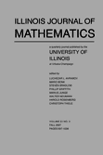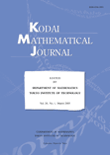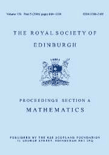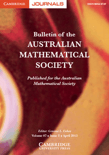
ILLINOIS JOURNAL OF MATHEMATICS
Scope & Guideline
Championing original research in mathematics.
Introduction
Aims and Scopes
- Algebraic Structures and Theory:
The journal publishes significant works in algebra, including studies on rings, algebras, and modules, with a focus on their structural properties and applications. - Geometric Analysis and Topology:
Research exploring geometric flows, metrics on manifolds, and topological properties of spaces is a core area, highlighting the interplay between geometry and analysis. - Functional Analysis and Operator Theory:
Many articles delve into operator theory, including bounded and unbounded operators, spectral theory, and applications to functional spaces, emphasizing both theoretical and practical implications. - Probability and Stochastic Processes:
The journal includes works on probabilistic methods, stochastic processes, and ergodic theory, reflecting a strong interest in applying mathematical frameworks to real-world phenomena. - Complex Analysis and Differential Equations:
Papers addressing complex variables, differential equations, and their applications in various mathematical contexts are prevalent, showcasing the journal's commitment to these foundational areas. - Combinatorial and Number Theory:
The journal features research on combinatorial structures and number-theoretic problems, indicating a focus on discrete mathematics and its applications.
Trending and Emerging
- Noncommutative Geometry and Operator Algebras:
There is a noticeable increase in papers exploring noncommutative geometry and related operator algebras, indicating a growing interest in these advanced mathematical frameworks and their applications. - Geometric Flows and Analysis:
Research focusing on geometric flows, particularly within the context of Riemannian geometry and partial differential equations, is on the rise, showcasing an interest in the dynamic aspects of geometry. - Mathematical Physics and Applications:
The intersection of mathematics with physics, particularly through the study of differential equations and models in statistical mechanics, is becoming increasingly prominent in the journal. - Higher-Dimensional Algebra and Category Theory:
Emerging themes in higher-dimensional algebra and category theory reflect a trend towards abstract algebraic structures and their applications in various mathematical contexts. - Complex Dynamics and Fractal Geometry:
Research exploring complex dynamics and fractal geometry is gaining popularity, highlighting the journal's engagement with contemporary mathematical phenomena and their implications.
Declining or Waning
- Classical Geometry:
Topics related to classical Euclidean and non-Euclidean geometry appear to be less prevalent, indicating a possible shift towards more abstract or applied geometrical frameworks. - Elementary Number Theory:
Although still relevant, foundational topics in elementary number theory seem to be diminishing, as the focus shifts to more complex and applied aspects of number theory. - Basic Combinatorial Techniques:
While combinatorial mathematics remains a part of the journal's scope, basic techniques and classical problems may be receiving less attention compared to more sophisticated combinatorial structures.
Similar Journals

Kodai Mathematical Journal
Illuminating the Path of Mathematical DiscoveryKodai Mathematical Journal is a distinguished publication dedicated to advancing the field of mathematics, particularly in miscellaneous areas. Established in 1949, this esteemed journal has been a reputable source for researchers and practitioners who seek to contribute to the rich landscape of mathematical knowledge. Published by KINOKUNIYA CO LTD, the journal is based in the academic environment of Tokyo Institute of Technology and serves a global audience with rigorous and insightful research articles. Despite its current Q3 quartile ranking in the Scopus Mathematics category, which reflects its niche but impactful contributions, the journal is poised for growth; the convergence of traditional and novel mathematical techniques promises to enhance its relevance further. Researchers, professionals, and students are encouraged to engage with the rich content of the journal, aimed at fostering collaboration and nurturing innovation in the mathematical community. While currently not available as Open Access, Kodai Mathematical Journal remains a critical resource for those passionate about mathematics and its applications.

PUBLICATIONES MATHEMATICAE DEBRECEN
Exploring the Depths of Mathematical InquiryPublicationes Mathematicae Debrecen is a renowned international journal published by the University of Debrecen, Institute of Mathematics, situated in Hungary. This journal, with both ISSN 0033-3883 and E-ISSN 2064-2849, has established itself in the field of mathematics since its inception, with coverage extending from 1997 to 2024. Recognized for its rigorous academic standards, it currently holds a Q3 ranking in the mathematics (miscellaneous) category for 2023 and ranks at the 42nd percentile among general mathematics journals in Scopus. Publicationes Mathematicae Debrecen aims to disseminate high-quality research across various areas of mathematics, contributing to the advancement of knowledge and practice in this dynamic field. Although it is not an open-access journal, its readers can access a wealth of scholarly work that addresses both theoretical and applied mathematical issues, making it an invaluable resource for researchers, professionals, and students alike.

Mediterranean Journal of Mathematics
Advancing Mathematical Frontiers in the Mediterranean BasinThe Mediterranean Journal of Mathematics, published by SPRINGER BASEL AG, is a prominent platform dedicated to the advancement of mathematical research and education. Since its inception in 2004, this journal has been pivotal in disseminating high-quality research across various fields of mathematics, currently holding a notable Q2 ranking in the miscellaneous mathematics category as of 2023. With its ISSN 1660-5446 and E-ISSN 1660-5454, the journal enjoys a respected position in the academic community, evident by its Scopus rank of 129 out of 399 in General Mathematics, placing it in the 67th percentile. While primarily a subscription-based journal, it remains committed to providing a comprehensive resource for researchers, professionals, and students, fostering dialogue and exploration within the mathematical sciences. The Mediterranean Journal of Mathematics, based in Basel, Switzerland, continues to contribute significantly to the evolution of mathematical theory and practice, marking its relevance as we approach its 20th anniversary in 2024.

JOURNAL OF THE EUROPEAN MATHEMATICAL SOCIETY
Advancing Mathematical FrontiersThe JOURNAL OF THE EUROPEAN MATHEMATICAL SOCIETY, published by the EUROPEAN MATHEMATICAL SOCIETY (EMS), stands as a premier platform in the field of mathematics, known for its rigorous editorial standards and impactful contributions to both applied and theoretical aspects of the discipline. With a commendable Q1 ranking in both Applied Mathematics and Miscellaneous Mathematics categories, alongside a Scopus rank of 32 out of 399 in General Mathematics, this journal has established itself as a crucial resource for researchers and professionals. Since achieving Open Access status in 2021, it has expanded its reach, making cutting-edge research more accessible to a global audience. With a publication horizon extending from 2002 to 2024 and a dedicated focus on high-quality mathematical scholarship, the journal continues to foster innovation and collaboration within the mathematical community.

TRANSACTIONS OF THE AMERICAN MATHEMATICAL SOCIETY
Championing Excellence in Mathematical ResearchTRANSACTIONS OF THE AMERICAN MATHEMATICAL SOCIETY, published by the American Mathematical Society, is a premier journal in the field of mathematics that has been contributing to the advancement of mathematical knowledge since 1900. With an ISSN of 0002-9947 and an E-ISSN of 1088-6850, this journal holds a prestigious position in the academic landscape, evidenced by its Q1 rankings in both Applied Mathematics and Miscellaneous Mathematics categories as of 2023. With a Scopus ranking of #97 in General Mathematics and a percentile standing of 75th, the journal is recognized for its rigorous peer-review process and the quality of the research it publishes. Though it does not currently offer open access options, it essentially serves as a vital resource for researchers, professionals, and students seeking critical insights and developments in mathematical theory and applications. The Transactions aim to publish high-quality research articles that foster the exchange and dissemination of ideas, supporting the growth of both theoretical and applied mathematics within the global scholarly community.

PROCEEDINGS OF THE ROYAL SOCIETY OF EDINBURGH SECTION A-MATHEMATICS
Pioneering Insights in Mathematical SciencesPROCEEDINGS OF THE ROYAL SOCIETY OF EDINBURGH SECTION A-MATHEMATICS is a prestigious journal published by Cambridge University Press, focusing on high-quality research in the field of mathematics. Established in 1975, this journal has carved a niche in the academic community, evidenced by its categorization in the Q1 quartile for Mathematics (miscellaneous) in 2023 and a commendable Scopus rank of #59 out of 399 in General Mathematics, positioning it within the 85th percentile among its peers. The journal serves as a platform for disseminating innovative mathematical theories and methodologies, making it an essential resource for researchers, professionals, and students alike. Though not currently an open-access publication, it offers various access options catering to a broad audience. With a publication timeline extending through to 2024, PROCEEDINGS OF THE ROYAL SOCIETY OF EDINBURGH SECTION A-MATHEMATICS remains committed to advancing mathematical knowledge and fostering a scholarly environment conducive to scientific inquiry and collaboration.

BULLETIN OF THE AUSTRALIAN MATHEMATICAL SOCIETY
Illuminating Mathematical Innovations for GenerationsBULLETIN OF THE AUSTRALIAN MATHEMATICAL SOCIETY is an esteemed journal dedicated to advancing the field of mathematics, published by Cambridge University Press. Since its inception in 1969, this periodical has fostered scholarly communication and showcased pivotal research in various domains of mathematics, now projected to continue until 2024. With an impact factor that places it in the Q2 category of miscellaneous mathematics research, it holds a notable position among its peers, ranking 215th out of 399 in the Scopus database. Though it does not currently offer open access options, the journal remains a vital resource for researchers, professionals, and students seeking to deepen their understanding of mathematical advancements. The Bulletin serves as a crucial platform for disseminating original research, comprehensive reviews, and insightful perspectives that navigate the complexities of mathematics today, ensuring the community is well-informed and engaged.

Dissertationes Mathematicae
Exploring the Depths of Mathematical Knowledge.Dissertationes Mathematicae is a prestigious academic journal published by the Polish Academy of Sciences Institute of Mathematics (IMPan), renowned for its contributions to the field of mathematics since its inception. With an impressive Q1 ranking in the miscellaneous mathematics category for 2023 and positioned at Rank #73 out of 399 in General Mathematics according to Scopus, this journal serves as a pivotal platform for disseminating high-quality research and innovative theoretical developments. Spanning from 2000 to 2024, it focuses on a broad range of mathematical disciplines, encouraging interdisciplinary collaboration and advancing mathematical understanding globally. While it currently does not offer open access, the journal is highly regarded in academic circles and continues to attract submissions from respected researchers and institutions. With a commitment to excellence and a notable impact factor, Dissertationes Mathematicae plays a crucial role in the ongoing development of mathematical theories and applications, making it an essential resource for researchers, professionals, and students alike.

ACTA MATHEMATICA HUNGARICA
Connecting Scholars Through High-Impact Mathematical InquiryACTA MATHEMATICA HUNGARICA, published by SPRINGER, is a prestigious academic journal that has been a cornerstone in the field of mathematics since its inception in 1983. With a robust impact factor that reflects its relevance in the discipline, this journal occupies a notable position within the Q2 category in Mathematics (miscellaneous), ranking 167 out of 399 in Scopus for General Mathematics, placing it in the 58th percentile. The journal serves as an essential platform for disseminating high-quality research, offering insights into a diverse array of mathematical topics, including pure and applied mathematics. Although not an open-access publication, it ensures that the latest findings and methodologies reach a broad audience, contributing to ongoing discussions and innovations in the field. By maintaining a commitment to rigorous peer review and academic excellence, ACTA MATHEMATICA HUNGARICA significantly impacts the mathematical community and supports researchers, professionals, and students striving to advance their knowledge and expertise in mathematics.

Periodica Mathematica Hungarica
Pioneering Insights in the World of Mathematics.Periodica Mathematica Hungarica is a prestigious academic journal published by Springer, focusing on the field of mathematics, with a particular emphasis on miscellaneous mathematical studies. Established in 1971, this journal has maintained its commitment to advancing mathematical research and its applications, making significant contributions over its converged years through 2024. With a Q2 ranking in the mathematics category as of 2023, it establishes itself as a vital resource within the mathematical community. Researchers and academics will find its inclusion in the Scopus database, ranking #189 out of 399 in general mathematics, indicative of its impact and relevance. Although it does not feature open access, the journal provides a wealth of high-quality peer-reviewed articles, thereby serving as an essential platform for the dissemination of innovative mathematical theories, methodologies, and findings. Engaging with the content of Periodica Mathematica Hungarica is crucial for anyone looking to stay at the forefront of mathematical research and development.